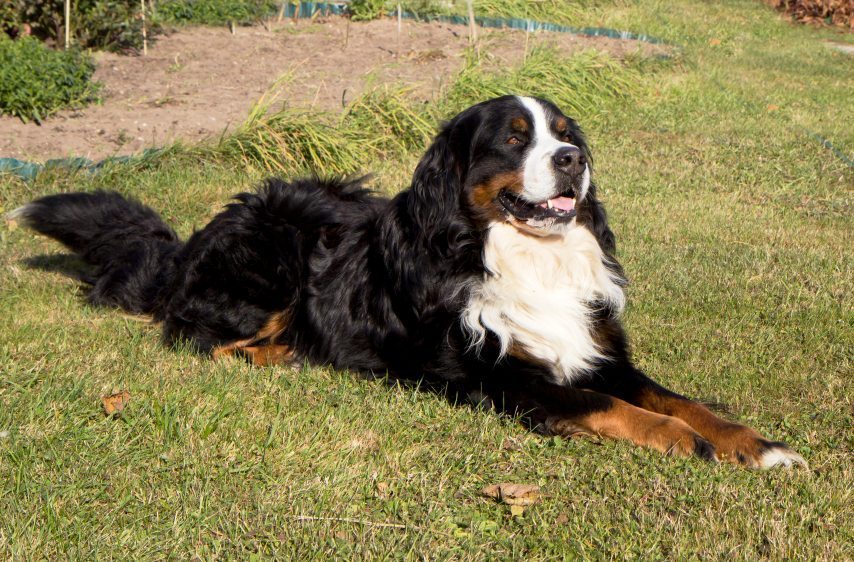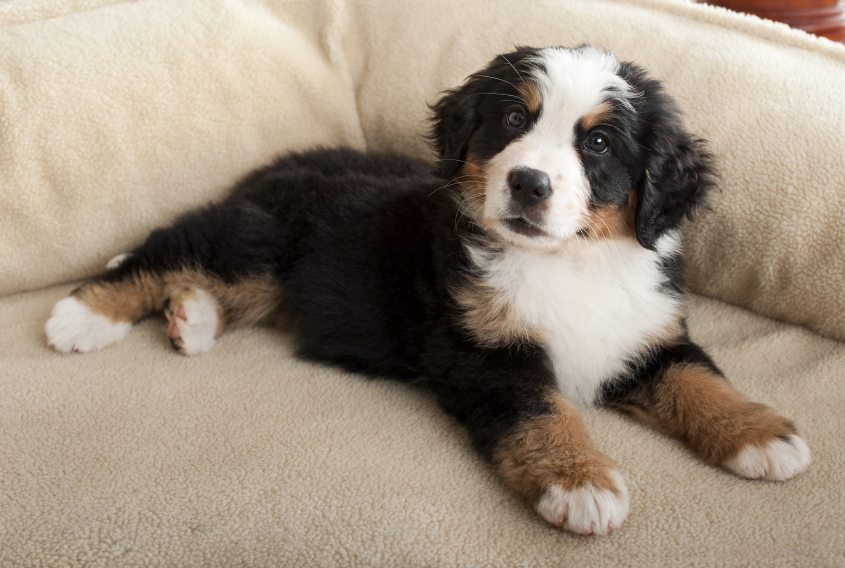
The Bernese Mountain Dog was bred to work the mountains and farmlands of Switzerland as well as herd cattle and being a great watchdog.
There are four types of Swiss Mountain Dog and the Bernese is the only one with long hair. He’s large and sturdy, standing anywhere from 23 to 27 inches tall. He generally weighs between 70 and 115 pounds but his life span tends to be relatively short at 6 to 8 years.
Breed History
This type of dog – also known as a Berner from the region in which he originated – is a mastiff type dog because of his size. It’s estimated that the Bernese has been working farms in Switzerland for more than 2000 years.
After the end of World War I, these dogs were exported first to England and then to the United States. But it wasn’t until 1937 that the AKC accepted this breed into their working class.
Appearance
A highlight of Bernese fur is a thick double coat that is a tricolor of black, rust and bright white. Typically, there will be a white marking on the chest that looks like an upside down cross as well as a blaze between the eyes.
Personality
You may think that a dog this size might be gruff or even standoffish but the Bernese Mountain Dog is affectionate and intelligent. He thrives when participating in family activities and, because of his size, it’s important to train and socialize him early.
Aggression is not a hallmark of his personality but, because he tends to be a bit shy with those he doesn’t know, it’s a good idea to get him out into the world and used to different situations and scenarios.

Health Concerns
Like any breed, Bernese Mountain Dogs are susceptible to health conditions that run in their blood line. Of particular concern are the various forms of cancer that seem to attack this breed.
Hip dysplasia is also a concern because of their size as well as something called gastric torsion. Gastric torsion is a form of bloat that affects dogs who have deep, large chests. Torsion occurs when the stomach is distended with gas or air and, as a result, twists.
If you have decided to buy a Bernese mountain dog from a breeder, make sure that the breeder you’ve selected provides you with appropriate health certificates for both the parents and puppies. If a reader puts you off on these certificates, walk away and find someone else.
Trainability
While these dogs are relatively easy to train and very gentle with children, make sure to socialize them early in a puppy kindergarten class and continue training throughout her life. These dogs are known to develop barking, digging or chewing habits if they are isolated from people for any length of time.
Grooming Requirements
Bernese Mountain Dogs invented the term “shed”. Spring and fall are the peak times when shedding occurs most and you will want to brush her several times a week and give her a bath every three months or so.
Also make sure to brush your dog’s teeth, trim her nails and check her ears for any sign of infection.
Thinking About Adding A Bernese Mountain Dog To Your Family?
Please consider adopting before purchasing and please avoid purchasing an animal from a pet store. There are many good pure bred Bernese Mountain Dogs in need of good homes. Click here to search for you a Bernese Mountain Dog in need of adoption near you: <Petfinder>
Reference Link: http://dogtime.com/dog-breeds/bernese-mountain-dog
Photo Credit: istockphoto.com









